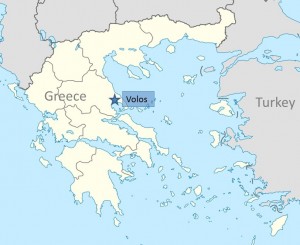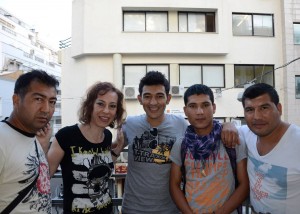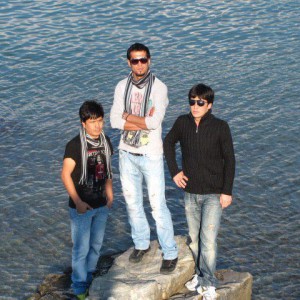Editor’s Note: Marina Mogli has degrees from universities in Greece and the UK. She has taught English and Greek languages in public schools and in private institutions. She has been teaching at the University of Thessaly in Greeece since 2012 and since 2010, she has been teaching Greek to immigrants to Greece from many countries, including Afghanistan, Russia, Estonia, Mexico, Pakistan, Albania, Slovakia, Hungary, the Czech Republic, the Ukraine, the Dominican Republic, Korea, Germany, England, Morocco and Turkey. She has recently volunteered her talents to serve as a Lead Mentor for the Pax Populi Tutoring Services program. We are honored to have her share her talents through our peace through education program.Â
* * * * *

Volos, Greece, where the author has taught Afghan refugees (Map adapted from Wikipedia)
In 2010, in a spur of the moment decision, I decided to volunteer to teach Greek to immigrants and asylum seekers in the Immigrant Center in my hometown, Volos in the port city in Greek region of Thessaly. [Add maps & photos] I always wanted to do something to help people and I happened to learn from a friend that one could teach Greek there. Since I was an experienced ESL (English as a Second Language) teacher (or so I thought) I decided it would be nice to devote some of my time and expertise to this end. I had no idea how much this experience would change my life. I went with the sole purpose to give and didn’t expect anything in return.
After some time I got a call from the Immigrant Center and was told that there were some refugees who wanted to learn Greek.  We set up a meeting and it turned out that they were two young men, in their mid twenties, from Afghanistan. I didn’t know anything about the country and I am ashamed to admit that I didn’t even know exactly where it was. I went home and looked at a map, and with that, began an adventure.
In the first lesson my new pupils were very, very shy and didn’t even look at me in the eye. I tried to be friendly, but for two months they continued to be shy, and only after quite a while did they come to feel a bit more comfortable with me.
They couldn’t really speak any Greek which proved a challenge in the beginning, but we got over that pretty quickly, as they started to improve in the language. I soon realized they hadn’t been to school at all in Afghanistan or had one or two years of schooling. This was a big surprise for me. Coming from a European country that stresses so much the importance of education and where going to school is something all children do, I took it for granted that they would have had at least a few years of schooling. In the time I taught them I learnt not to take for granted many things I thought everyone enjoyed in Europe.
Since I had always taught English as a foreign language I had always had students (even when I taught young kids) who were literate in their mother tongue. I took so many things for granted in my teaching in the beginning, For example, they didn’t know anything about punctuation.

Marina with some of her Afghan students in Greece
I also thought the progress they made was very slow, because the pace of the lesson was very slow. I was a bit frustrated and kept trying to come up with solutions in order to facilitate their learning. In the meantime, word spread that I was a good teacher (as I found out later) and very soon I had a class of about 8 young men. I also found out later, they had made other attempts to learn Greek in various contexts, but they were soon disappointed and dropped the lessons after one or two months. When you are an immigrant and you are trying to survive and hold on to any job that would sustain you, you have no time to waste. And because they had no time to waste, they were very quick to judge when lessons didn’t help them. However, unless they had work obligations, they never missed a class.
I tried to encourage them to take initiatives with the lessons, as we do in the West, but it didn’t work. When I gave them any choice, they always answered, “You are the teacher, you decideâ€. I soon gave up and took all the decisions concerning the lessons myself. I always had a fascination with Asia, had read a lot about it, and had been to India many times so I knew the kind of respect teachers are given in those countries. It helped me immensely because I knew a lot about dress codes and the Muslim religion and I tried to dress sensibly when we had class. I didn’t think they would notice but much later I found out they did. They noticed every single thing I did, but never said anything —  I had to develop a more friendly relationship with one of the boys and he told me all that much later. I had also read the Koran and when I told them, they were very impressed.
After some time, and since there were only Afghan people in my class, I decided to buy a dictionary so as to be able to explain any unknown words in their language. When I asked them what language they spoke in their country, they answered “Farsiâ€. So the next thing I did was to order an English-Farsi and Farsi-English dictionary on line. Of course there are no Greek-Farsi dictionaries.
The purchase of the dictionary acquired a significance of epic proportions. In the beginning they didn’t even dare to touch it. They asked where I had bought it. They later surmised how much I cared for them and wanted to help learn the language by comparing me to all their previous teachers by conferring on me the mark of distinction, “but you bought the dictionary!†It was not only the fact that it made the lesson easier that was important for them; it was a gesture that showed that I cared that was immensely appreciated.
When they got over their initial shyness they started telling me things about their homeland. They were all Hazara, one of the most persecuted ethnic groups in Afghanistan. They had left their homes at a very young age. Some had been to Quetta, Pakistan, some to Iran, many to both places. They had been working since they were little and didn’t have the chance to go to school. In a country torn by decades of war and when survival is your number one priority, school is a luxury. Many of them bitterly regretted the fact that they didn’t get an education and it led them to believe they could not succeed academically in learning Greek. I didn’t agree with that and I often told them how proud I was of their progress. I also started learning some words in their language. The very first thing I learned in Farsi was the expression “Chi misheh?†(i.e., “What does this mean?â€).
One day I will never forget, one of my students said he liked poetry. I was greatly surprised. I had stupidly assumed that since they hadn’t been to school they wouldn’t have such interests. I was very ashamed of this and immediately incorporated poetry in my classes. I also loved poetry but somehow I had got out of the habit of reading it and this incident prompted me to start again. Once I mentioned a Greek proverb and I then realized they also liked proverbs very much and that some Afghan proverbs were even similar to Greek proverbs. I incorporated proverbs in my lesson too. We did one or two at the end of every class and they greatly enjoyed them. They also told me some of their proverbs. I then became very interested in their history and culture. I started reading about Afghanistan and paid attention every time I heard anything about the country on TV. I read anything I could get my hands on, books or articles, and I started listening to Afghan music. I learned a lot about their culture and traditions. I had long been fascinated with Asia, but always with India. Well, life had other plans for me. I had strayed a bit further northwest quite by chance. It was destiny, or “ghesmat†as my students put it in Farsi.

Afghan refugees a long way from home (Photos supplied by author)
I also learned a lot about what it is like to be a refugee. Soon I was an expert in how much it costs to pay a smuggler to get you to Europe. I heard stories of walking for days to cross mountainous regions in Turkey, being stranded in boats for days without food or water to get to Greece. Most of them were not even 18 years old when they had to go through all that. The thought shocked me! They had many problems in Greece too — problems with their asylum cases, by being exploited by unscrupulous employers… you name it, they experienced it. And yet, they seldom complained. I came to realize that they were very proud and honorable people. They had faced racism not only in their homeland, but in every country they went, and of course they faced it in Greece, because they were foreigners. Some friends of mine, who were not very keen on the idea of me being alone in a room with ten young men, sometimes asked if I was afraid. I answered that not only was I never afraid but I was pretty sure that if anyone came to the room and threatened me for any reason or if I was in danger, they would protect me with their lives. Of all the other nationalities I had taught, the Afghans were the most honest, reserved, respectful, proud and hardworking people I have encountered. They soon became my favorite.
They never failed to remind me what a good teacher I was and how much they appreciated the fact that I was teaching them without getting paid. They sent me text messages with wishes at Christmas and Easter. I can’t really express in words how much love, gratitude and respect I got. I had started the lessons in order to give and didn’t expect so much in return. The experience changed me immensely, both as a teacher and as a person. As a teacher I had to literally reevaluate everything I thought I knew about teaching. I had to teach a foreign language to people who hadn’t been to school and that made my task doubly difficult. Not only that, but I had to navigate significant cultural differences. It took me a long time to realize that they never asked for clarification if they didn’t understand something, I had to be very sensitive so as to recognize myself if they didn’t understand and then explain again. They never took the initiative; they expected me to make all the decisions concerning the lesson. They also didn’t do any homework, I guess mainly because they were busy with work. For that reason, after a point I stopped assigning exercises and did everything in class. As a result, the lessons progressed very slowly and in the beginning I fear I may have rushed through things.
I can’t stress enough how much the experience changed me as person. Besides all the love and gratitude they expressed and the window to another country and culture that was opened for me, I also became very sensitive to the problems immigrants and refugees were facing. Before teaching them I only heard about illegal border crossing and things like that on TV. Now, these were real people with real stories to me. I had never realized how lucky I was to live in Europe and to have a passport that enabled me to travel anywhere. Having papers was their dream, they were prepared to do anything for it, even put their lives at risk. Before, I never thought about fake passports and paying one’s entire life’s savings to smugglers to get you to Europe. I had read about those things, but here I was getting firsthand experience, and it just wasn’t the same as watching a documentary about illegal immigrants.
I thought that I was simply teaching them the language, and didn’t think it was such a big deal. I also tried to find odds jobs for them, because I knew work was very important for them not only because they needed the money but because their families back in Afghanistan or Pakistan were depending on them for support. When one of the students decided to leave Greece and we went out for coffee to say goodbye, he opened up his heart and he told me many things, he told me how important what I did was for them. They saw me not only as their teacher but as the mother they had left behind or a big sister. They told me they would be eternally grateful for everything I had done for them and thought they would never be able to repay me. I was astounded! I had no idea how much it meant for them. I couldn’t help but cry at so much gratitude.
In the meantime, the financial crisis hit Greece really hard. The immigrants and refugees were the first ones to be affected. They found it increasingly difficult to get jobs or to get paid by their employers for the work they did. All that, and the fact that the asylum procedure was very slow and almost never led to the granting of asylum in Greece drove them to the decision to leave the country. One by one I started to lose my students. Some of them fled (illegally of course) to other European countries in the hope of getting asylum cases there, some went to Athens and some even went back to Afghanistan. They always came to say goodbye and I always ended up crying and they (too proud to cry) were also very sad. I was also very afraid they would do something to put their lives at risk. Many people have died in their attempt to cross borders, but these were my students; I cared deeply about them, they were not just part of the statistics. I jumped every time I heard something about an Afghan refugee being killed when they tried to flee using risky means such as traveling underneath a truck. Luckily, when they reached a safe place they always called me or sent me messages on Facebook, and my heart went back to its place.
All those original Afghan students I had have now left Greece. I can only hope that their adventures are over and they will have a chance of a good life somewhere else. The bonds that we have tied are very strong. I am able to keep up with their news by talking with them on the phone or chatting on Facebook. I know now how much what I did meant to them and that they will never forget me. I will never forget them either. The experience changed all of us for the better. It is, just as the Persian proverb goes, (which is the same in Greek and in English), “Gandom kashti, gandom barmidari,†i.e., “You reap what you sow.â€
3 Comments
Marina · February 24, 2016 at 12:26 pm
Thank you for your good words, everyone. Sophia, of course there is other work being done, we have lessons in other languages, we organize events, we collect food and clothes for the refugees, we provide free legal advice and so many other things. There are many other teachers all over Greece who provide lessons to immigrants, too. Some of the most organized ones are ΟδυσσÎας-Σχολείο ΑλληλεγγÏης in Thessaloniki and ΚυÏιακάτικο Σχολείο Μεταναστών in Athens to name but a few. Learning the language is key to integration and empowerment of the immigrants and refugees.
Sophia · February 23, 2016 at 11:41 pm
Hi Marina,
I am so inspired by your work and I think this is a very important endeavor. Providing Greek language classes to refugees to help with social and educational integration. Is there other work being done by the Immigration Center or other teachers like yourself on a larger scale? I would like to know. Thank you!
Tatjana · April 15, 2015 at 10:52 am
Marina is not only an inteligent woman and a great teacher, but a wonderful, caring person. Wishing her all the very best for each and every one of her future endeavors!